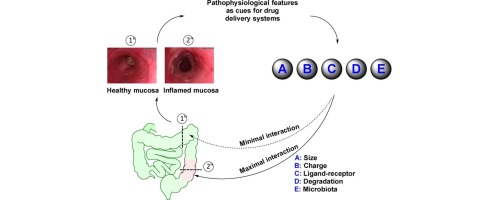当前位置:
X-MOL 学术
›
Nano Today
›
论文详情
Our official English website, www.x-mol.net, welcomes your feedback! (Note: you will need to create a separate account there.)
Nanoparticulate drug delivery systems targeting inflammation for treatment of inflammatory bowel disease
Nano Today ( IF 17.4 ) Pub Date : 2017-10-01 , DOI: 10.1016/j.nantod.2017.08.006 Sufeng Zhang , Robert Langer , Giovanni Traverso
Nano Today ( IF 17.4 ) Pub Date : 2017-10-01 , DOI: 10.1016/j.nantod.2017.08.006 Sufeng Zhang , Robert Langer , Giovanni Traverso

|
Inflammatory bowel disease (IBD) is a chronic, idiopathic inflammatory set of conditions that can affect the entire gastrointestinal (GI) tract and is associated with an increased risk of colorectal cancer. To date there is no curative therapy for IBD; therefore life-long medication can be necessary for IBD management if surgery is to be avoided. Drug delivery systems specific to the colon have improved IBD treatment and several such systems are available to patients. However, current delivery systems for IBD do not target drugs to the site of inflammation, which leads to frequent dosing and potentially severe side effects that can adversely impact patients' adherence to medication. There is a need for novel drug delivery systems that can target drugs to the site of inflammation, prolong local drug availability, improve therapeutic efficacy, and reduce drug side effects. Nanoparticulate (NP) systems are attractive in designing targeted drug delivery systems for the treatment of IBD because of their unique physicochemical properties and capability of targeting the site of disease. This review analyzes the microenvironment at the site of inflammation in IBD, highlighting the pathophysiological features as possible cues for targeted delivery; discusses different strategies and mechanisms of NP targeting IBD, including size-, charge-, ligand-receptor, degradation- and microbiome-mediated approaches; and summarizes recent progress on using NPs towards improved therapies for IBD. Finally, challenges and future directions in this field are presented to advance the development of targeted drug delivery for IBD treatment.
中文翻译:

靶向炎症的纳米颗粒药物递送系统用于治疗炎症性肠病
炎症性肠病 (IBD) 是一组慢性特发性炎症,可影响整个胃肠 (GI) 道,并与结直肠癌风险增加有关。迄今为止,IBD 尚无治愈性疗法。因此,如果要避免手术,IBD 管理可能需要终生服药。针对结肠的药物递送系统已经改进了 IBD 治疗,并且患者可以使用几种这样的系统。然而,目前的 IBD 给药系统不会将药物靶向炎症部位,这会导致频繁给药和潜在的严重副作用,从而对患者对药物的依从性产生不利影响。需要能够将药物靶向炎症部位、延长局部药物可用性、提高治疗效果的新型药物递送系统,并减少药物副作用。纳米颗粒 (NP) 系统在设计用于治疗 IBD 的靶向药物递送系统方面具有吸引力,因为它们具有独特的物理化学特性和靶向疾病部位的能力。本综述分析了 IBD 炎症部位的微环境,强调了病理生理特征作为靶向给药的可能线索;讨论了 NP 靶向 IBD 的不同策略和机制,包括大小、电荷、配体受体、降解和微生物组介导的方法;并总结了使用 NPs 改进 IBD 疗法的最新进展。最后,提出了该领域的挑战和未来方向,以推动 IBD 治疗靶向药物递送的发展。纳米颗粒 (NP) 系统在设计用于治疗 IBD 的靶向药物递送系统方面具有吸引力,因为它们具有独特的物理化学特性和靶向疾病部位的能力。本综述分析了 IBD 炎症部位的微环境,强调了病理生理特征作为靶向给药的可能线索;讨论了 NP 靶向 IBD 的不同策略和机制,包括大小、电荷、配体受体、降解和微生物组介导的方法;并总结了使用 NPs 改进 IBD 疗法的最新进展。最后,提出了该领域的挑战和未来方向,以推动 IBD 治疗靶向药物递送的发展。纳米颗粒 (NP) 系统在设计用于治疗 IBD 的靶向药物递送系统方面具有吸引力,因为它们具有独特的物理化学特性和靶向疾病部位的能力。本综述分析了 IBD 炎症部位的微环境,强调了病理生理特征作为靶向给药的可能线索;讨论了 NP 靶向 IBD 的不同策略和机制,包括大小、电荷、配体受体、降解和微生物组介导的方法;并总结了使用 NPs 改进 IBD 疗法的最新进展。最后,提出了该领域的挑战和未来方向,以推动 IBD 治疗靶向药物递送的发展。
更新日期:2017-10-01
中文翻译:

靶向炎症的纳米颗粒药物递送系统用于治疗炎症性肠病
炎症性肠病 (IBD) 是一组慢性特发性炎症,可影响整个胃肠 (GI) 道,并与结直肠癌风险增加有关。迄今为止,IBD 尚无治愈性疗法。因此,如果要避免手术,IBD 管理可能需要终生服药。针对结肠的药物递送系统已经改进了 IBD 治疗,并且患者可以使用几种这样的系统。然而,目前的 IBD 给药系统不会将药物靶向炎症部位,这会导致频繁给药和潜在的严重副作用,从而对患者对药物的依从性产生不利影响。需要能够将药物靶向炎症部位、延长局部药物可用性、提高治疗效果的新型药物递送系统,并减少药物副作用。纳米颗粒 (NP) 系统在设计用于治疗 IBD 的靶向药物递送系统方面具有吸引力,因为它们具有独特的物理化学特性和靶向疾病部位的能力。本综述分析了 IBD 炎症部位的微环境,强调了病理生理特征作为靶向给药的可能线索;讨论了 NP 靶向 IBD 的不同策略和机制,包括大小、电荷、配体受体、降解和微生物组介导的方法;并总结了使用 NPs 改进 IBD 疗法的最新进展。最后,提出了该领域的挑战和未来方向,以推动 IBD 治疗靶向药物递送的发展。纳米颗粒 (NP) 系统在设计用于治疗 IBD 的靶向药物递送系统方面具有吸引力,因为它们具有独特的物理化学特性和靶向疾病部位的能力。本综述分析了 IBD 炎症部位的微环境,强调了病理生理特征作为靶向给药的可能线索;讨论了 NP 靶向 IBD 的不同策略和机制,包括大小、电荷、配体受体、降解和微生物组介导的方法;并总结了使用 NPs 改进 IBD 疗法的最新进展。最后,提出了该领域的挑战和未来方向,以推动 IBD 治疗靶向药物递送的发展。纳米颗粒 (NP) 系统在设计用于治疗 IBD 的靶向药物递送系统方面具有吸引力,因为它们具有独特的物理化学特性和靶向疾病部位的能力。本综述分析了 IBD 炎症部位的微环境,强调了病理生理特征作为靶向给药的可能线索;讨论了 NP 靶向 IBD 的不同策略和机制,包括大小、电荷、配体受体、降解和微生物组介导的方法;并总结了使用 NPs 改进 IBD 疗法的最新进展。最后,提出了该领域的挑战和未来方向,以推动 IBD 治疗靶向药物递送的发展。



























 京公网安备 11010802027423号
京公网安备 11010802027423号